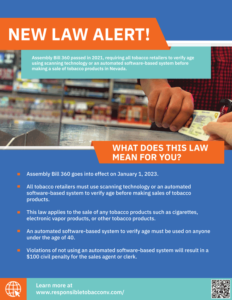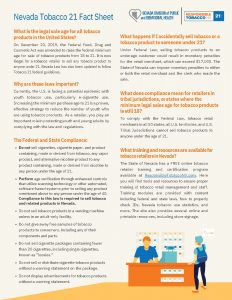

AB36 0 requires all tobacco retailers to verify age using scanning technology or an automated software-based system before making a sale of tobacco products in Nevada. This law went into effect on January 1, 2023. To comply with this law, scan ID technology must be used to verify age before selling any tobacco product to any customer under the age of 40. For more information about age verification scanning technology, download the FAQs fact sheet.
0 requires all tobacco retailers to verify age using scanning technology or an automated software-based system before making a sale of tobacco products in Nevada. This law went into effect on January 1, 2023. To comply with this law, scan ID technology must be used to verify age before selling any tobacco product to any customer under the age of 40. For more information about age verification scanning technology, download the FAQs fact sheet.
For more information related to Tobacco 21, download the FAQs fact sheet. 
On December 20, 2019, the Federal Food, Drug and Cosmetic Act was amended to raise the federal minimum age of sale of tobacco products from 18 to 21 years. It is illegal for a retailer to sell any tobacco product – including cigarettes, cigar and electronic vaping products to anyone under 21.
The minimum sale age for ANY tobacco product – including cigarettes, cigars and electronic vaping products is now 21 years old.
The FDA offers guidance on how to comply with the law:
For more information, visit the FDA website.
There is no current state law as to what age the clerk or cashier needs to be to sell tobacco or tobacco products. As long as the clerk or cashier is of legal age to work in Nevada they are allowed to sell.
It is important to remember:
For more information about retailer education and training visit Responsible Tobacco NV.
These laws are designed to make regulated tobacco products less accessible and less attractive to youth. Increasing the minimum sale age for tobacco products to 21 is an effective strategy to reduce smoking and other tobacco use among youth and save lives.
About 95% of smokers start before age 21. Every day, nationwide, nearly 1,900 kids smoke their first cigarette, and in Nevada, 800 kids become daily smokers every year. And one-third of them will die prematurely as a result. Tobacco use results in more than 480,000 deaths as a result of cigarette smoking or exposure to secondhand smoke.
Increasing the tobacco age to 21 will help to prevent young people from ever starting to smoke and to reduce the deaths, disease and health care costs caused by tobacco use.
Although youth cigarette use has decreased, this decline is now being offset by increases in other products like electronic vaping products – which is creating a new generation of Nevadans who are at risk of nicotine addiction.
A report by the Institute of Medicine (IOM) strongly concluded that raising the tobacco age at the national level would significantly reduce the number of adolescents and young adults who start smoking and reduce smoking-related deaths. According to the modeling conducted by IOM, the age group that will see the largest decrease in initiation rates by raising the minimum age of legal access to 21 will be youth ages 15-17.
In Nevada:
Source: 2023 NV High School Youth Risk Behavior Survey
Increasing the age to 21 can decrease youth usage in our community and nationwide!
In order to comply with federal law, retailers cannot sell to those under the age of 21. This is true in states that have not yet raised the minimum age in state law and in those places where exemptions were created for military service members. The minimum legal sales age is 21 for all people in all places. This holds true in all states, U.S. territories, and Tribal jurisdictions.
Many tobacco retail licensing requirements also require compliance with all applicable federal laws, meaning that a retailer could lose its license or face significant fines or other penalties for failing to comply with federal law, even if the Tribal, state, or local jurisdiction at issue has not raised its own minimum legal sales age.
